

Free Work & Career Training at GCFLearnFree. Free Job Success Tutorial at GCFLearnFree. Work Skills: Time Sheet - Page 1. 21st century skills video - Bing video. 21st century skills video - Bing video. 21st century skills video - Bing video. Skills You Need - Helping You Develop Life Skills. Employability Skills 2000+ Français The skills you need to enter, stay in, and progress in the world of work—whether you work on your own or as a part of a team.
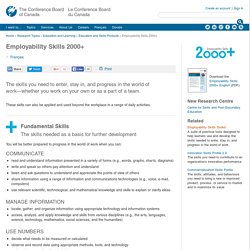
These skills can also be applied and used beyond the workplace in a range of daily activities. You will be better prepared to progress in the world of work when you can: read and understand information presented in a variety of forms (e.g., words, graphs, charts, diagrams) write and speak so others pay attention and understand listen and ask questions to understand and appreciate the points of view of others share information using a range of information and communications technologies (e.g., voice, e-mail, computers) use relevant scientific, technological, and mathematical knowledge and skills to explain or clarify ideas decide what needs to be measured or calculated observe and record data using appropriate methods, tools, and technology make estimates and verify calculations.
Softskills. Skills to Pay the Bills - Office of Disability Employment Policy - US Department of Labor. What are Interpersonal Skills? Interpersonal skills are the life skills we use every day to communicate and interact with other people, both individually and in groups.
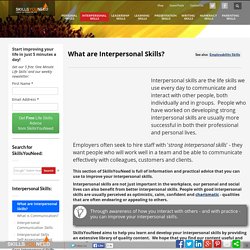
People who have worked on developing strong interpersonal skills are usually more successful in both their professional and personal lives. Employers often seek to hire staff with 'strong interpersonal skills' - they want people who will work well in a team and be able to communicate effectively with colleagues, customers and clients. This section of SkillsYouNeed is full of information and practical advice that you can use to improve your interpersonal skills. ODEP - Office of Disability Employment Policy - Youth in Transition - Soft Skills: The Competitive Edge. ODEP - Office of Disability Employment Policy - Driving Change Creating Opportunity Overview "Skills to Pay the Bills: Mastering Soft Skills for Workplace Success," is a curriculum developed by ODEP focused on teaching "soft" or workforce readiness skills to youth, including youth with disabilities.
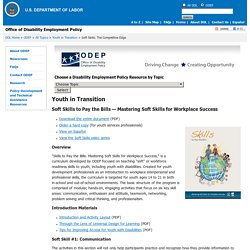
Created for youth development professionals as an introduction to workplace interpersonal and professional skills, the curriculum is targeted for youth ages 14 to 21 in both in-school and out-of-school environments. The basic structure of the program is comprised of modular, hands-on, engaging activities that focus on six key skill areas: communication, enthusiasm and attitude, teamwork, networking, problem solving and critical thinking, and professionalism. Introduction Materials Soft Skill #1: Communication Download Soft Skill #1: Communication (PDF) Soft Skill #2: Enthusiasm & Attitude Download Soft Skill #2: Enthusiasm & Attitude (PDF) Employability Skills Framework. Watch & Listen: Why Do Employability Skills Matter?
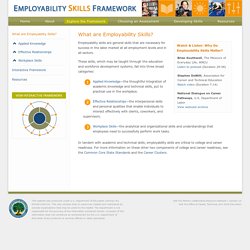
Employability skills are general skills that are necessary for success in the labor market at all employment levels and in all sectors. These skills, which may be taught through the education and workforce development systems, fall into three broad categories: Applied Knowledge—the thoughtful integration of academic knowledge and technical skills, put to practical use in the workplace. Effective Relationships—the interpersonal skills and personal qualities that enable individuals to interact effectively with clients, coworkers, and supervisors. ODEP - Office of Disability Employment Policy - Youth in Transition - Soft Skills: The Competitive Edge.
Overview "Skills to Pay the Bills: Mastering Soft Skills for Workplace Success," is a curriculum developed by ODEP focused on teaching "soft" or workforce readiness skills to youth, including youth with disabilities.
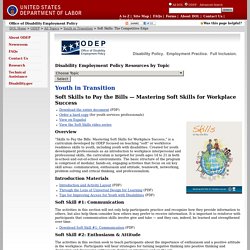
Created for youth development professionals as an introduction to workplace interpersonal and professional skills, the curriculum is targeted for youth ages 14 to 21 in both in-school and out-of-school environments. The basic structure of the program is comprised of modular, hands-on, engaging activities that focus on six key skill areas: communication, enthusiasm and attitude, teamwork, networking, problem solving and critical thinking, and professionalism. Introduction Materials Soft Skill #1: Communication The activities in this section will not only help participants practice and recognize how they provide information to others, but also help them consider how others may prefer to receive information.
Download Soft Skill #1: Communication (PDF) Soft Skill #3: Teamwork. Interpersonal Skills Self-Assessment Skills You Need. Interpersonal skills are fundamental to successful relationships at home, at school, at work and socially.
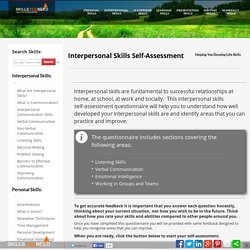
This interpersonal skills self-assessment questionnaire will help you to understand how well developed your interpersonal skills are and identify areas that you can practice and improve. The questionnaire includes sections covering the following areas: Listening Skills Verbal Communication Emotional Intelligence Working in Groups and Teams To get accurate feedback it is important that you answer each question honestly, thinking about your current situation, not how you wish to be in the future. Think about how you rate your skills and abilities compared to other people around you. Once you have completed this questionnaire you will be provided with some feedback designed to help you recognise areas that you can improve.
When you are ready, click the button below to start your self-assessment. A Summary of Major DOL Laws. The Department of Labor (DOL) administers and enforces more than 180 federal laws.
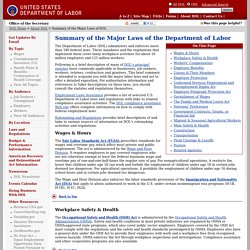
These mandates and the regulations that implement them cover many workplace activities for about 10 million employers and 125 million workers. Following is a brief description of many of DOL's principal statutes most commonly applicable to businesses, job seekers, workers, retirees, contractors and grantees. This brief summary is intended to acquaint you with the major labor laws and not to offer a detailed exposition. For authoritative information and references to fuller descriptions on these laws, you should consult the statutes and regulations themselves. Employment Laws Assistance provides a list of selected U.S. Department of Labor. Georgia Future Business Leaders of America.